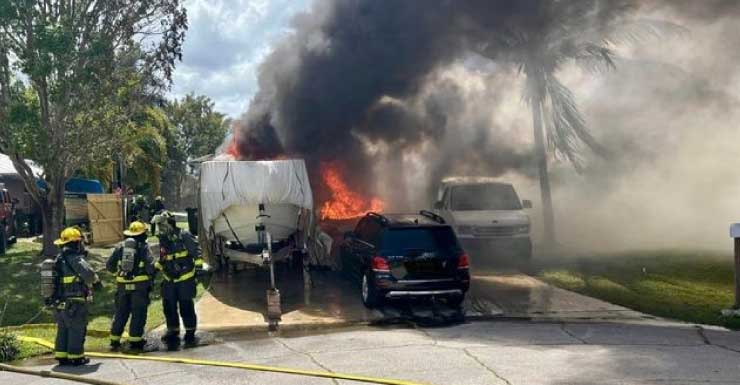18 Fla. L. Weekly Supp. 29b
Online Reference: FLWSUPP 1801COL2
Insurance — Personal injury protection — Admissions — Trial court abused its discretion in not granting insurer relief from admissions to assert that its policy did not cover injuries of passenger who is owner of vehicle with respect to which security is required under Florida No-Fault Law where motion to withdraw admissions was timely filed prior to trial court granting summary judgment, granting motion will facilitate presenting merits of case, and medical provider did not establish that it would be prejudiced in presenting its suit — Affirmative defenses — Abuse of discretion to deny motion to amend answer and affirmative defenses where amendment would not introduce new cause of action — Abuse of discretion to deny insurer’s request to amend interrogatory responses where leave of court is not required to amend interrogatory responses
UNITED AUTOMOBILE INSURANCE COMPANY, a Florida Corporation, Appellant, v. FRIEDMAN CHIROPRACTIC CENTER, a/a/o Maritza Collado, Appellee. Circuit Court, 11th Judicial Circuit (Appellate) in and for Miami-Dade County. Case Nos. 08-487 AP & 09-118 AP. L.C. Case No. 06-7096 CC 26. August 18, 2010. On appeal from a final judgment rendered by the Miami-Dade County Court, Hon. Robin Faber. Counsel: Thomas L. Hunker, United Automobile Insurance Company, Office of the General Counsel, Miami, for Appellant. Marlene S. Reiss, Law Offices of Marlene S. Reiss, P.A., for Appellee.
(Before FIRTEL, SIGLER, and ESPINOSA DENNIS, JJ.)
(PER CURIAM.) United Automobile Insurance Company (“insurer”) provided automobile insurance to Martha Ibarra (“insured”). When the accident occurred, Maritza Collado (“claimant”) was a passenger in the insured’s vehicle. The claimant received medical services provided by Friedman Chiropractic Center (“medical provider”). The medical provider billed the insurer for its services. The insurer declined paying these bills. The medical provider filed a civil suit against the insurer seeking compensation for its medical services.
During discovery, the insurer admitted in its response to the request for admissions that it provided personal injury protection coverage for the claimant. The insurer’s sworn interrogatory response asserted that it did not possess any coverage defenses. The claimant’s August 6, 2008 deposition revealed facts causing the insurer to question whether its policy covered her injuries. Around September 26, 2008, before the summary judgment hearing, the insurer moved the trial court for relief from its admissions and interrogatory responses and requested leave to amend its admissions and interrogatory responses. The insurer wished to assert that its policy no longer covered the claimant’s injuries.1 The trial court denied the insurer relief from its responses and leave to amend its admissions and interrogatory responses. The trial court also denied the insurer’s emergency motion to continue the final summary judgment hearing and its emergency second motion for leave to amend the answer and affirmative defenses. The lower court granted final summary judgment (reasonability, relatedness, and necessity) in the medical provider’s favor, rendered final judgment, and awarded the medical provider trial court attorney’s fees pursuant to sections 627.428 and 627.736(8), Florida Statutes. We have jurisdiction to review this post-judgment appeal pursuant to section 26.012(1), Florida Statutes.
The insurer contends that the trial court erred by not permitting it to withdraw and amend its admissions. We agree. Florida Rule of Civil Procedure 1.370(b) requires a liberal application favoring “amendment in most cases in order to allow disposition on the merits.” Ramos v. Growing Together, Inc., 672 So. 2d 103, 104 (Fla. 4th DCA 1996) [21 Fla. L. Weekly D991b]. We review a non-final discovery order for discretionary abuse. Weck v. Weck, 464 So. 2d 619 (Fla. 4th DCA 1985). We interpret a procedural rule in accord with its plain meaning. Stowe v. Universal Prop. & Cas. Ins. Co., 937 So. 2d 156, 158 (Fla. 4th DCA 2006) [31 Fla. L. Weekly D1859a]. In the instant matter, the insurer clearly moved the trial court to amend its admissions; therefore, Rule 1.370(b) requires that we consider (1) whether amending the admissions will assist in presenting the merits and (2) whether the medical provider satisfied the court that amendment will prejudice it.
In Ramos, the defendant filed its motion for relief from admissions prior to the trial court granting summary judgment based upon the defendant’s technical admissions. 672 So. 2d at 104. The district court concluded that the trial court abused its discretion by failing to grant the requested relief from admissions and by denying the request to amend the responses. Id. Here, the insurer moved to withdraw its admissions before the summary judgment hearing. The insured’s examination under oath and the Florida Department of Highway Safety Motor Vehicle Inquiry Report2 support the insurer’s contention that the claimant owned a vehicle on the accident date and that the policy, does not cover her injuries. Furthermore, during the August 6, 2008 deposition, the claimant testified that she did not live with the insured on the date of loss, and that she owned a 2005 Honda Civic when the accident occurred. She also testified that she insured her vehicle when the accident occurred.3 Under these circumstances, we conclude that amending the admissions will facilitate resolving the merits. Fla. R. Civ. P. 1.370(b).
We next consider whether amending the admissions will prejudice the medical provider. The insurer asserts that the medical provider would suffer no unfair prejudice if the insurer withdrew its admissions. The medical provider argues that it relied upon the insurer’s admission, regarding the lack of coverage, for two years. A district court found prejudice where a plaintiff moved to file late answers to a request for admissions after the summary judgment hearing. Asset Mgmt. Consultants of Virginia v. City of Tamarac, 913 So. 2d 11801181 (Fla. 4th DCA 2005) [30 Fla. L. Weekly D2415a]. Unlike City of Tamarac, the instant insurer moved to amend before the summary judgment hearing. Considering that the insurer requested relief from its admissions before the summary judgment hearing and Ramos’s preference for amendment, we refuse to presume prejudice despite the medical provider’s reliance upon the insurer’s admissions. The medical provider’s reliance argument diminishes when confronted by the fact that the insurer did not depose the claimant until August 6, 2008, approximately a month-and-a-half before the insurer moved to amend its admissions. We conclude that the medical provider did not sufficiently demonstrate that it will suffer prejudice in presenting its civil suit. We hold that the trial court abused its discretion by failing to permit the insurer to amend its admissions prior to the summary judgment hearing.
The medical provider posits that the trial court correctly denied the insurer leave to amend its affirmative defenses considering that the insurer previously admitted insurance coverage for a year and a half. “A party may, with leave of court, amend a pleading at or even after a hearing and ruling on a motion for summary judgment.” Cardona v. Benton Express, Inc., 804 So. 2d 505, 507 (Fla. 3d DCA 2001) [27 Fla. L. Weekly D76a]. A trial court abuses its discretion by permitting “an amendment” when amendment will introduce “a new cause of action.” Id. Here, the insurer moved to amend its affirmative defense before the summary judgment hearing. The trial court did not find that amending the answer would introduce a new cause of action into the litigation. We reverse the order denying leave to amend the affirmative defenses. Id.
The medical provider asserts that the trial court correctly denied the insurer’s request to amend its interrogatory responses. A “party who has responded to a request for discovery with a response that was complete when made is under no duty to supplement the response to include information thereafter acquired.” Fla. R. Civ. P. 1.280(e) (emphasis added). Florida Rule of Civil Procedure 1.280(e) applies to interrogatory responses. Estate of Lochhead v. Branam, 443 So. 2d 283, 284 (Fla. 4th DCA 1984). Therefore, no duty obligated the insurer to amend its interrogatory responses. However, Florida Rule of Civil Procedure 1.280(e)’s plain language did not prohibit the insurer from voluntarily amending its interrogatory responses. In comparison, Florida Rule of Civil Procedure 1.340 also does not require leave of court to amend an interrogatory response. We found no Florida case mandating a litigant to obtain leave before amending an interrogatory response.4 Here, the trial court’s order prevented the insurer from voluntarily updating its interrogatory response despite Rule 1.340 not forbidding amendment. Thus, the trial court eliminated a discovery option exclusively within the insurer’s discretion. We conclude that the trial court abused its discretion and reverse this non-final order.
During oral argument, the medical provider conceded that we must reverse the non-final order excluding the peer review report and affidavit from summary judgment evidence. We agree and reverse the order excluding the affidavit.5
Considering our conclusions regarding amending the admissions and interrogatory responses and reversing the non-final order excluding the affidavit, we change the evidentiary landscape in this litigation. As the insurer may assert a coverage affirmative defense on remand, we reverse the final summary judgment without prejudice to a renewed summary judgment motion.6 We reverse the final judgment. Because we reverse the final judgment, we also reverse the final judgment for trial court attorney’s fee. United Auto. Ins. Co. v. Jose Orellana, 16 Fla. L. Weekly Supp. 505a (Fla. 11th Cir. Ct. April 2, 2009). We deny the medical provider’s requests for section 627.428(1), Florida Statutes, appellate attorney’s fees since the medical provider does not prevail on appeal.
Reversed and remanded.
__________________
1The insurance policy excludes “any person, other than the named insured, if such person is the owner of a motor vehicle with respect to which security is required under the Florida Motor Vehicle No-Fault Law” (R. 406) (emphasis added).
2This report demonstrates that an auto dealer issued an original title on December 2, 2004 with the claimant listed as the owner (R. 570).
3She later contradicted herself and testified that on the accident date, May 4, 2006, it was possible that she did not have any automotive insurance on her vehicle. She agreed that she purchased a new automobile insurance policy with American Independent Insurance Company a few days after the instant accident. The trial court will serve as the best forum to resolve this factual dispute.
4“Some states may include other formulations, such as that a party has no obligation to supplement a complete answer to include information thereafter received, unless a timely supplemental interrogatory is served.” 23 Am. Jur. 2d Depositions and Discovery § 13 cmt. (2010) (footnote omitted). In contrast, federal courts mandate a litigant to supplement or amend an interrogatory response. Fed. R. Civ. P. 26(e)(1).
5See United Auto. Ins. Co. v. Metro Injury & Rehab Center, 16 So. 3d 897, 900 (Fla. 3d DCA 2009) [34 Fla. L. Weekly D1516a]; State Farm Mut. Auto. Ins. Co. v. Hyma Med. Center, Inc., 16 Fla. L. Weekly Supp. 1129a (Fla. 1 1th Cir. Ct. Oct. 29, 2009) (Leban, J.).
6See Leal v. Deutsche Bank Nat’l Trust Co., 21 So. 3d 907, 909 (Fla. 3d DCA 2009) [34 Fla. L. Weekly D2304c] (stating that a party moving for summary judgment must factually refute or disprove the non-moving party’s affirmative defenses or demonstrate their insufficiency as a matter of law).




 how can I help you?
how can I help you?